
All Children’s Hospital Los Angeles locations are open.
Wildfire Support Line for Current Patients, Families and Team Members:
323-361-1121 (no texts)
8 a.m. - 7 p.m.

“The Succar bloodline is a bloodline of warriors,” his father told him, sitting beside him in his hospital room that evening. “You’re strong. You’re powerful. You’re untouchable. That’s why I know you’re going to succeed, Jeremiah. That’s why I know you’re going to be OK.”
He would tell him again the next morning on the way to the operating room, where all the adults in those masks where you can only see the eyeballs were waiting to remove the rock from his head. As they led him away, his father leaned over and told him again, “Don’t forget how strong you are.”
Jeremiah Succar absorbed every word. He kept them for those times when he would need them. Through every stinging injection, every oppressive MRI tube, every weakening round of chemo—every treatment required to eliminate that marauding rock in his head, he would repeat his father’s exhortation: “I’m strong because I’m a Succar.”
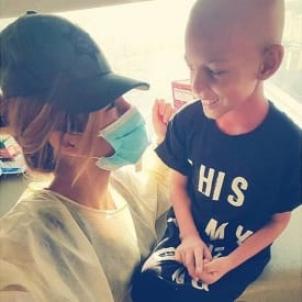
“One thing they told me is that you never lie to them,” Jeremiah’s mother, Jessica Frontela, says.
So he would be told that it wasn’t a rock in his head, but a tumor that had settled in the left side of his brain.
It came on so fast, at the end of May 2015, after a week of headaches and vomiting that his mother and father took to be a case of the flu. A local hospital told Jessica blood tests were negative and said it was nothing, a manifestation of Jeremiah’s distress over his parents’ separation. “We see it so often,” they told her. “Kids are upset and they act out in that way.”
Jessica didn’t buy it. She and Jeremiah’s dad had been apart for more than two years, so that theory didn’t hold. “I know my son,” she says. “I had seen his symptoms. I couldn't imagine Jeremiah making himself vomit and complaining about pain over his father, especially because they see each other often. Since ‘Miah could understand, he's known that we’re separated. I just knew it wasn't right.”
She took Jeremiah to a second children’s hospital as the pain in his head engulfed him. “I bribed him to tell them how much it was hurting because he didn’t want to be there, so he wasn’t saying how much it hurt.”
A CT scan identified a mass. Within 24 hours, he was having emergency surgery to drain fluid from his brain and release the cranial pressure that had caused him to start seizing. “He went from Tylenol to morphine in a day,” Jessica says.
She placed a call to Jeremiah’s father. It was 2 a.m. in Cancun, Mexico, where Jerry Succar manages his family’s resort. Only a week prior, he had been at Jessica’s home in Downey, visiting their three kids, Jeremiah and his brother and sister.
“There was a flight that took off four hours after that phone call,” Jerry says. “I was on that flight.” He wouldn’t return to Cancun for four months.
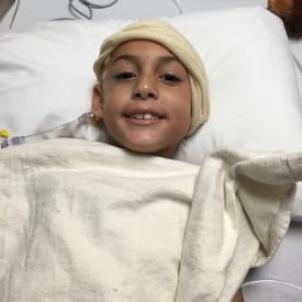
Two days after the mass was found, Jeremiah went for surgery to have it removed. The diagnosis was stage-4 atypical teratoid rhabdoid tumor (ATRT).
“It is one of the most aggressive tumors that children have,” says Jeremiah’s doctor, Girish Dhall, MD, director of Neuro-oncology at Children’s Hospital Los Angeles. “Long-term survival rates are extremely low, maybe 10 to 20 percent.”
Dhall says ATRT usually strikes in infancy. Jeremiah was 7. Through the ensuing summer and fall, he received six rounds of chemotherapy—the final three the higher-dose myeloblative chemo accompanied by autologous stem cell rescue, whereby the patient’s stem cells are withdrawn ahead of the procedure to “rescue” them from damage, and then afterward returned to the patient’s bloodstream to restart cell renewal.
“They home into the bone marrow, set up shop and start dividing,” Dhall explains, “and within two to three weeks you get new cells.”
Before undergoing the procedure in August, Jeremiah was transferred to CHLA, one of the few pediatric centers in Southern California to administer it.
Three MRIs since the treatments ended, including the most recent one at the end of August, have all shown no presence of the disease. He’s still a good distance from the first major threshold.
“Typically, with these aggressive cancers, if they come back, they come back within the first two years,” Dhall says. “It’s never zero percent, but typically it’s within the first two years of the diagnosis.”
“We wait,” Jessica says. “That’s all we can do. We come, we do our scans, we go talk to the doctor, they say he’s clear. Everything’s done in front of him.” She knows what not to say. “Don’t tell him it’s done and over because we don’t know.”
The most difficult information is kept from him, but Jeremiah’s a smart kid and he wants explanations. “Every chemo, every IV bag change, any time they touched him, he wanted to know why,” Jessica says.
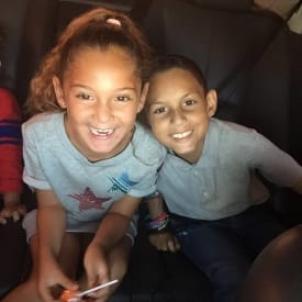
Side effects of the chemo have surfaced. He has pain in his hips and legs and some trouble with balance. Audiology tests have detected early hearing loss. He’ll eventually need a hearing aid.
But even so, Jeremiah is largely back to the child he was before the diagnosis. He got his hair back, for one. He’s gained 20 pounds and developed muscle, thanks to a summer in Cancun with his father without any restrictions on his activities, save for avoiding any contact to the head. He has a shunt installed to continue to draw off fluid from the brain and avert swelling.
For eight weeks, he rode atop dolphins, took swimming lessons, and did tae kwon do—he initiated all the blows, he didn’t receive any. “He would swim when he’d wake up,” Jerry says. “Sometimes I would have to pull him out of the pool when it was evening.”
“Overall, functional-wise, he’s a normal kid,” Dhall says. “That’s our goal.”
Jeremiah’s now back in school after a year away. Jessica homeschooled him so he could complete the second grade, move up with his class and stay ahead of his sister, Julianna, a year younger. “Since his sister is right under him,” Jessica says, “I still wanted him to be the big brother.”
His wit and timing are well above grade level. Asked what he thought of swimming with dolphins, he says with a blank glare, “I didn’t like it,” and then waits for two beats before brightening and delivering the kicker: “I loved it!”
He continues to be buoyed by the sense of self his father’s stories instilled. Jerry says he conceived of his warrior family history on the spot. “It’s not even true,” he says. “My dad’s from Lebanon, my mom’s from Mexico. I was making these things up as I went, to lift his confidence, to give him something to believe in. If he believed he was untouchable, he would be untouchable.”
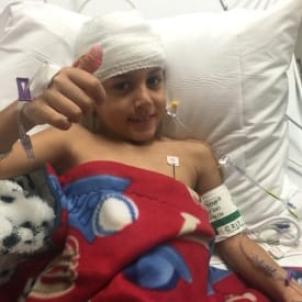
Jerry acknowledges he also fights to keep his own strength up. “On a human level, it’s just too much to process. Any parent who receives information that there’s a high probability of your son not making it in a short period of time, it can just destroy you. It really can. I allowed myself to cry, to show pain, hurt and worry, when I was alone. Every time I was with my son or with my other kids, I would be strong, at least appearances-wise. The confidence I’d transmit to him. I would be able to give him that strength.”
He knows Jeremiah received it. “The day after his surgery, he was speaking on the phone with his grandfather—my father. My father said, ‘My grandson, what do you need? Anything you need I can get it for you.’ Jeremiah responded, ‘Grandpa, don’t you know? I’m a Succar. I’m already strong. I don’t need anything.’”
Who says the Succar bloodline isn’t truly a bloodline of warriors? It is now.
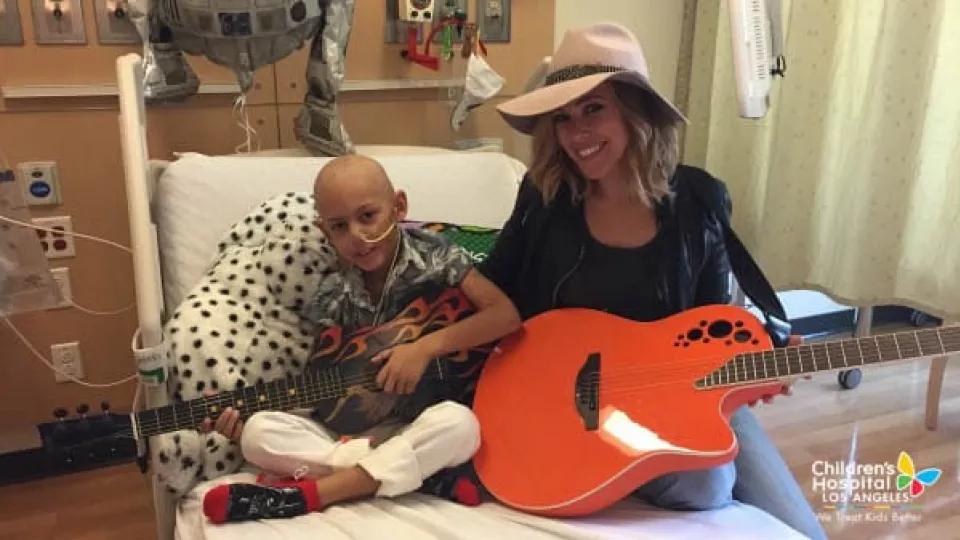
Jeremiah draws on a second source of strength. A year ago, a music therapist introduced him to “Fight Song,” Rachel Platten’s popular anthem of persistence and self-belief. “He would sing it whenever he wasn’t feeling well,” his mother says, “every single time he had a hard moment, whether it was getting an IV or going in for surgery.”
After a cousin started the Twitter hashtag #RachelMeetJeremiah, the message wound through social media and got around to Platten. The singer visited Jeremiah in his room at CHLA last August; the video of the two doing a spontaneous duet of “Fight Song” drew national coverage. A few months later, Platten was back in L.A. to perform and she visited Jeremiah at home in Downey. She invited him to come to her concert and sing “Fight Song” with her onstage, but he was leaving for Cancun on spring break. It’s a standing offer, as Platten regularly checks in on him.